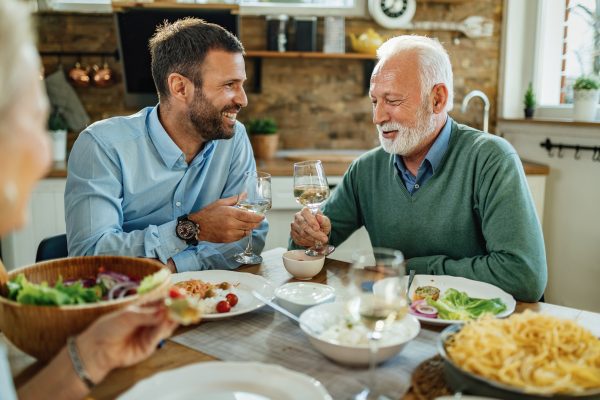Newsletter: May 2021
Family Dinner is Good for Adults, Too
.
For the past year, team member Bri has regularly expanded her family dinner table to include her father. “My mom died three years ago, and Dad lives alone a few hours’ drive away from us,” she says. “He’s never been one for cooking or eating well — that was Mom’s job. Once the pandemic hit, we worried about him not only being totally isolated, but trying to survive on crackers and Velveeta.”
To work with quarantine protocols, they set up a system where her dad would spend at least two weeks at his home, then at least two weeks at hers. “What ended up happening was that the visits would stretch longer and longer,” Bri shares. “Two weeks would become three or even four sometimes. Dad helped us tackle some home projects, because he’s very handy. We joked that we paid him in dinners. But my husband noticed that the more Dad ate with us, the more he came out of his shell. He seemed happier. He found his appetite, too, and went from picking at meals to eating second helpings of some dinners. He started lingering at the table with us to tell stories, talk politics or make plans.”
Often, child-free adults or empty nesters ask us whether family dinners are really worth the trouble. Why bother eating together if there are no kids around? It’s true that when we talk about the benefits of family dinners, we usually focus on the positive impact dinner can have on kids. But as Bri and her family experienced, shared meals are also great for adults — those with kids at home, and those without. We asked Dr. Anne Fishel to shed some light on what dinner does for grown-ups, and she shared some important points.
The Benefits of Family Dinner for Adults
- Shared meals improve mental health and performance. Studies have shown that eating with other people is a mood-boosting activity, no matter how old you are. “To all the parents who are feeling worn out by the cooking and cleaning up of a million meals during the pandemic, this is good news,” Dr. Fishel says. “Across the lifespan, from young adults eating in college cafeterias to newly married couples to empty nesters, shared meals are associated with better mood.”
And you don’t have to eat with people you’re related to, either. Firefighters are a great example of non-related people who have frequent “family” dinners. Researchers have shown that shared meals at the firehouse correspond to better team performance. That’s probably partly due to the the cooperative skills the firefighters hone while sharing the duties of cooking and clean-up. - Eating with others improves adults’ physical health. Adults who eat alone are more likely to skip meals. Their physical well-being might also decline because of poorer nutrition. (This sounds like Bri’s concern about her father’s tendency to graze on Velveeta!) But those who eat with others not only eat more regular meals, they also eat better meals. Adults eat more fruits and vegetables at shared mealtimes, and are less likely to choose fast food than those who are eating alone.
- Adults who eat with kids make healthier food choices. When kids are at the table, grown-ups seem even more conscious of nutrition. Parents who eat with their children are more likely to offer nutritious choices, probably because they’re trying to provide good role modeling to the kids. They’re also less likely to report behaviors like binge eating or dieting. And interestingly, while eating with other adults doesn’t prevent weight gain, eating dinner with kids does seem to help grown-ups keep off the extra pounds. “Parents may refrain from unhealthy eating behaviors when they know their kids are watching and poised to imitate them,” Dr. Fishel says.
- Family dinner leads to lower stress levels. Dr. Fishel admits that “it may seem counterintuitive” because of the workload involved in planning, shopping, cooking and cleaning up from family dinners. But despite all that, recent research has shown that parents who eat with their kids frequently are less stressed than parents who don’t prioritize family dinners. They also report fewer depressive symptoms and better self-esteem.
- Eating together can improve your marriage. That positive impact on stress and personal well-being can also extend to greater satisfaction with your spouse. New parents — a particularly stressed-out, emotionally vulnerable group of people! — actually tend to feel more satisfied with their marriages if they and their spouse make time for family meals. “It’s unclear which way the causality goes,” Dr. Fishel says. She points out that it’s also possible that more strongly bonded couples will naturally eat together more often. Still, she says, “setting up meaningful rituals like shared meals can offer more predictability during a time of life that can be very busy and chaotic.”
In other words, it doesn’t matter very much whether a stronger marriage leads to more shared meals, or more shared meals lead to a stronger marriage. When you’re burnt out from caring for little ones, eating together is more likely to help your relationship than harm it.
Sure, many of us probably already knew that eating with others is good for our physical and mental health. Just look at all the people who have gone to great lengths to set up Zoom family dinners for parents and grandparents during the pandemic. Somehow, they knew deep down that eating together, even on a screen, was going to be more satisfying than just talking to the webcam. Still, it’s nice to have some proof that sitting down with others and sharing a meal is a healthy, rewarding activity at every stage of life. So the next time you’re tempted to skip family dinner and just nibble on some cheese instead, remember that you’ll be doing yourself a favor if you find someone to share it with.
Family of the Month
The Burroughs family are a great example of how family dinners can change when the kids are grown — and what couples can learn from the experience!
Real Family Dinner Projects: The Burroughs Family
Food

Speaking of adults, this month you might be celebrating a particularly special adult in your lives — Mom. This crustless vegetable quiche is a great brunch recipe for Mother’s Day, or any day!
Vegetable Quiche, Hold the Crust
Fun

Rekindle the romance with an at-home “restaurant” experience that’s perfect for date night!
Conversation

It’s easy to get stuck in a conversational rut. These grown-up alternatives to “How was your day?” can help get the conversation flowing again.
Recent Newsletters
- When Picky Eating Might Be Something More - July 2024
- Feeling Lonely? Share a Meal. - June 2024
- Welcome to May Madness - May 2024
- Family Dinner Has Gotten Expensive - April 2024
- Is it the Family, Or the Dinner? - March 2024
- Black History Month at Family Dinner - February 2024
- New Year, Same You - January 2024
- Sharing the Holiday Load - December 2023
- What’s Your Thanksgiving Story? - November 2023
- Family Dinner: Stressful, or Stress-Busting? - October 2023
- New Ways to Ask “How Was Your Day?” - September 2023
- Low Stress, Low Cost, Low Waste Dinner Hacks - August 2023
